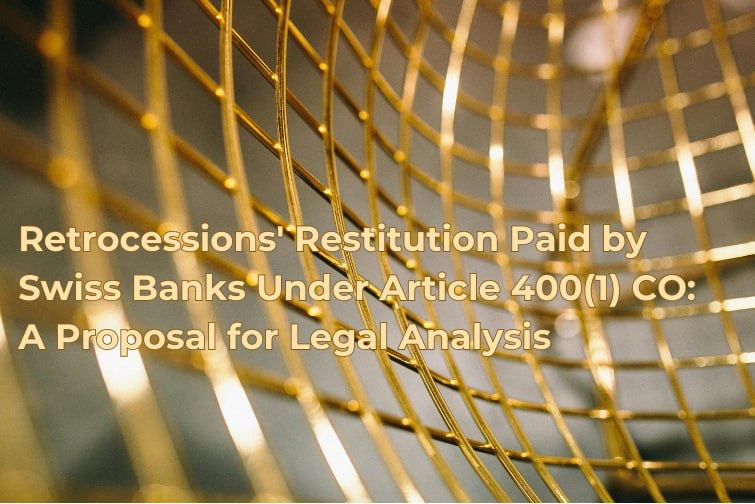Banking retrocessions raise legal and ethical questions. This article provides a legal analysis of retrocessions paid by banks to wealth managers, focusing solely on the restitution obligations defined by Art. 400(1) of the Swiss Code of Obligations (CO) from a wealth manager towards its client.
The underlying idea of this provision is that the agent, apart from receiving their fees, should neither gain nor suffer loss from the execution of the mandate.[1]
1. Art. 400(1) CO Establishing the Principle
Under Art. 400(1) CO, the agent is obliged, at the request of the principal, to provide an account of their activities at any time and to return everything they have received in connection with their mandate, regardless of the title under which it was received.
The obligation to provide an account (Rechenschaftsablegung; obligation de reddition de compte) enables the principal to monitor the agent’s activities. It forms the basis of the restitution obligation and is limited by the principles of good faith.[2]
The duty to provide an account, like the duty to restitute (Herausgabepflicht; devoir de restitution), aims to ensure the agent’s diligence and loyalty obligations (Art. 398(2) CO) and to safeguard the principal’s interests by preventing any risk of conflict of interest for the agent, ensuring that the agent does not prioritize their own or third-party interests over the principal’s.[3]
This obligation is justified by the fact that the agent’s activities should neither cost them anything nor enrich them beyond the agreed fees with the principal.[4]
The principle that the agent should neither be impoverished nor enriched by the mandate, and the goal of preventing conflicts of interest inherent in the restitution obligation, are decisive factors in determining whether the financial advantage received by the agent from a third party is indirectly related to the execution of the mandate and must be restituted, or whether it was merely coincidentally received during the mandate without intrinsic relation to it and thus need not be restituted.[5]
In the presence of third-party allocations, an intrinsic relationship must be assumed if there is a risk that the agent might not sufficiently consider the principal’s interests due to these allocations; it is not necessary for the agent to actually act contrary to their obligations or for the principal to suffer damage.[6]
2. The Legal Framework of Retrocessions
The Federal Tribunal defines banking retrocessions as the processes by which a bank, based on a corresponding agreement, retrocedes a portion of a commission received from a client to a third party.[7]
The restitution obligation of Art. 400(1) CO covers not only what the agent has received from the principal or created themselves but also what they have received from third parties. Indirect benefits the agent must return include discounts, commissions, kickbacks, rebates, or retrocessions.[8]
Retrocessions, which are paid to the agent because they perform or induce certain management actions within the scope of the mandate, are intrinsically linked to the management and fall under the restitution obligation of Art. 400(1) CO.[9]
Swiss case law emphasizes the importance of transparency regarding retrocessions. Agents must not only disclose these payments but also, in the absence of an explicit waiver agreement from the principal, return them.[10]
3. An Informed Waiver
Art. 400(1) CO is a dispositive legal basis. Therefore, the principal can waive its right to receive the retrocessions paid to the agent. However, such a waiver is only valid if the principal has received comprehensive and truthful information about the expected retrocessions and if their willingness to waive restitution is explicitly stated in the agreement with the agent.[11]
In the context of an anticipated waiver, it is impossible to provide exact figures because the total managed wealth constantly changes, and the exact number or volume of transactions to be carried out is unknown at the time of the waiver.[12]
Therefore, for an anticipated waiver of restitution to be valid, it is not sufficient for the agent to provide a mere estimate;[13] the principal must be fully informed of the details and implications of these payments. This means the principal must know the parameters that allow calculating the total amount of retrocessions and enable a comparison with the agreed fees for wealth management.[14] This legal framework reinforces the principle that the agent should not derive undue profit from the mandate relationship.
For the principal to grasp the extent of expected retrocessions and compare them with the agreed management fees, they must at least know the key values of the retrocession agreements with third parties and the range of expected returns. This requirement is met in an anticipated waiver if the amount of expected retrocessions is indicated within a specific range, as a percentage of the managed wealth. Relating these two elements allows the principal to understand, for the purpose of waiving, the total costs of wealth management and recognize potential conflicts of interest for the wealth manager due to incentive structures.[15]
In other words, the principal who waives must compare how much these retrocessions amount to concerning the agreed wealth management fees, to know ultimately how much their agent receives.[16]
In this regard, it is insufficient that the principal had online access to their accounts if the IT system did not allow them to understand how commissions debited from the account were distributed among different participants in trading operations.[17]
The waiver agreement must be explicit and based on a comprehensive understanding of the financial consequences for the principal. Indeed, the burden falls on the agent who wishes to oppose the principal’s waiver of retrocessions to prove that the principal had sufficient information to make an informed waiver.[18] According to some legal scholars,[19] a pre-formulated clause in general terms would hardly meet this aspect. For the waiver to be valid, the bank should instead have the client sign a separate agreement on this point.[20]
This level of transparency is essential to ensure informed consent. This legal requirement emphasises the necessity of transparent and conscientious management of clients’ entrusted funds.
4. Recipient of the Obligation under Art. 400(1) CO
As previously mentioned, the action for an account primarily aims to allow the principal to monitor the agent’s activities. It should be noted that the Federal Tribunal considers information on potential retrocessions paid, as well as the declaration attesting to their completeness, as irrelevant for verifying the agent’s execution of the principal’s instructions.[21] While there is a duty to disclose information about retrocessions, this duty applies to the agent who receives funds from third parties indirectly in the performance of the mandate and must therefore return them, [22] and not to the one who pays them.
For this reason, in the case of retrocessions paid by the bank to a third party, the obligation of disclosure of information lies with the third party who received the retrocessions that the bank’s client must turn, not towards the bank that paid them (at least if there is a direct relationship between this third party and the client that would allow them to request this information)[23] to obtain information regarding the payment of these retrocessions.
5. Statute of Limitation of Retrocessions Related Claims
According to Art. 127 CO, all retrocession related claims are subject to a ten-year statute of limitation unless otherwise provided by federal civil law. Under Art. 128(1) CO, claims related to rents, annuities, interest on capital, and other periodic payments are subject to a five-year limitation period.
Case law holds that periodic payments are obligations that the debtor must fulfill at regular intervals under the same legal relationship.[24] This involves a duration-based relationship, from which periodic obligations arise, which are newly and independently created over time.[25]
However, retrocessions do not result from a duration-based relationship because they are not pre-agreed between the principal and the agent. The agent’s duty to account for these indirect benefits obtained from third parties and the corresponding claims of the principal for these benefits do not rest on a duration-based relationship but on the mere fact that the agent received these benefits.[26] Each duty of restitution thus rests on a separate basis. As a result, retrocessions do not fall under the scope of periodic payments of Art. 128(1) CO.[27] Therefore, the claims related to obligations to restitute retrocessions are subject to the general rule of Art. 127 CO.
Under Art. 130(1) CO, the limitation period begins as soon as the claim becomes due. The due date, when the creditor can claim their debt from the debtor, occurs immediately upon the claim’s creation, unless a term has been stipulated or results from the nature of the matter (Art. 75 CO). The limitation period starts for each restitution claim on the day the agent received the amount to be retroceded.[28]
Concluding remarks
In conclusion, the obligation to provide an account enables the principal to monitor the agent’s activities. Swiss case law emphasizes transparency regarding retrocessions, which agents must disclose and return unless explicitly waived by the principal.
According to Art. 400(1) CO, any waiver must be based on comprehensive and truthful information provided to the principal, with the waiver explicitly stated in the agreement. The principal must understand the extent of expected retrocessions, often indicated as a percentage of managed wealth, to compare them with agreed management fees.
The duty to disclose retrocessions applies to the agent receiving funds from third parties and not to the payer.
Claims related to the restitution of retrocessions fall under the general rule of Art. 127 CO, with a 10-year limitation period starting from the day on which the agent receives the amount to be retroceded.
Finally, the issue of banking retrocessions, although an established practice in wealth management, requires particular attention regarding legal compliance and professional ethics. Art. 400(1) CO plays a crucial role by imposing strict standards of transparency and restitution, which are fundamental for protecting clients’ interests.
[1] DFT 143 III 348, rec. 5.1.1.
[2] DFT 139 III 49, rec. 4.1.2.
[3] Decision of the Federal Tribunal 4A_266/2010 of 29 August 2011, rec. 2.3.
[4] DFT 138 III 755, rec. 4.2; Decision of the Federal Tribunal 4C.125/2002 of 27 September 2002, rec. 3.1.
[5] DFT 138 III 755, rec. 5.3.
[6] DFT 138 III 755, rec. 5.3.
[7] DFT 132 III 460, rec. 4, in JdT 2008 I p. 58.
[8] WERRO Franz, Le droit des contrats, Jurisprudence fédérale choisie et annotée, 2e éd., Berne 2019, p. 301.
[9] DFT 138 III 755, rec. 4.2; DFT 132 III 460, rec. 4.1.
[10] Decision of the Federal Tribunal 4A_355/2019 of 13 May 2020, rec. 3.1.
[11] DFT 137 III 393, rec. 2.2, p. 396; 132 III 460, rec. 4.2, p. 465 ff. and the references cited.
[12] Decision of the Civil Chamber of the Geneva Court of Justice ACJC/341/2021 of 16 March 2021, rec. 2.1.1.
[13] DFT 132 III 460, rec. 4.1, in JdT 2008 I 53.
[14] DFT 137 III 393, rec. 2.4, p. 399.
[15] DFT 137 III 393, rec. 2.4, p. 399.
[16] Decision of the Federal Tribunal 4A_355/2019 of 13 May 2020, rec. 3.1.
[17] Decision of the Civil Chamber of the Geneva Court of Justice ACJC/341/2021 of 16 March 2021, rec. 2.1.1.
[18] DFT 137 III 393, rec. 2.5, in JdT 2012 II 168.
[19] BASTIAN Enzo, La restitution de rétrocessions en cas de rapport execution only, Bulletin CEDIDAC n° 93.
[20] BASTIAN Enzo, La restitution de rétrocessions en cas de rapport execution only, Bulletin CEDIDAC n° 93.
[21] Decision of the Federal Tribunal 4A_436/2020 of 28 April 2022, rec. 7.5.2.
[22] DFT 137 III 393, rec. 2.1 et 2.5.
[23] Decision of the Federal Tribunal 4A_436/2020 of 28 April 2022, rec. 7.5.2.
[24] DFT 139 III 263, rec. 1.1; DFT 124 III 370, rec. 3c.
[25] DFT 143 III 348, rec. 5.2.1.
[26] GAUCH Peter, Periodisch geschuldete Leistungen: Gedanken zur Verjährungsbestimmung des Art. 128 Ziff. 1 OR, PJA 3/2014, p. 291.
[27] GAUCH Peter, Periodisch geschuldete Leistungen: Gedanken zur Verjährungsbestimmung des Art. 128 Ziff. 1 OR, PJA 3/2014, p. 291; TERCIER ET AL., Les contrats spéciaux, 5e éd. 2016, n. 4495 p. 641/642.
[28] DFT 143 III 348, rec. 5.3.
If you would like to find out more about this topic or would like to request consultation, please contact us!
Regulatory and Compliance
TA Advisory advises clients on a broad range of regulatory and compliance matters that have or might have an impact on various business dealings. Our clients are being updated on a regular basis and we help them to implement the necessary compliance procedures with the goal to mitigate legal risks.



